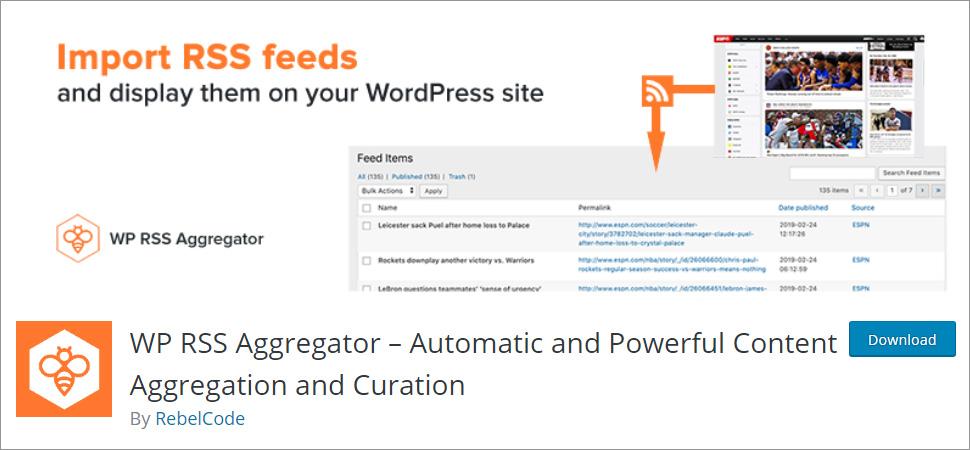Are you looking to supercharge your WordPress site’s content delivery and keep your audience engaged? If you’re not leveraging the power of RSS feeds, you might be missing out on a golden opportunity! In 2025, showcasing dynamic and timely content is more important than ever, and choosing the right RSS feed plugin can make all the difference. With a sea of options available, it’s crucial to find one that best fits your needs. That’s why we’ve taken the time to compare five of the best WordPress RSS feed plugins currently on the market. Whether you’re aiming to curate content, boost your SEO, or enhance user experience, our comprehensive guide will help you make an informed choice. Let’s dive in and discover how these plugins can transform your site and keep your readers coming back for more!
Understanding the Importance of RSS Feeds for Your WordPress Site
RSS (Really Simple Syndication) feeds are essential tools for optimizing content delivery and engagement on your WordPress site. By utilizing RSS feeds, you can ensure that your audience stays updated with the latest content without the need for manual checking. This automated delivery system enhances user experience and drives traffic, making it a crucial element for any successful website.
One of the significant benefits of RSS feeds is their ability to automate content distribution. With the right plugins, your site can automatically feed updates to subscribers or other platforms. This seamless integration means that your visitors can receive fresh content directly in their feed readers, email clients, or social media platforms. As a result, you not only increase your content’s reach but also foster a loyal community that eagerly awaits your updates.
Additionally, RSS feeds improve your site’s SEO by increasing backlinks and visibility. When your content is distributed through various channels, it creates opportunities for more backlinks as other websites pick up your feeds. Furthermore, search engines appreciate sites that consistently provide fresh content. This can lead to better rankings in search results, ultimately driving more organic traffic to your WordPress site.
Another key aspect of RSS feeds is the customization potential they offer. Many WordPress RSS feed plugins allow you to tailor your feed to match your branding and user preferences. You can choose which content to include, how often updates are sent, and even the format of the feed itself. This level of control helps you maintain a consistent brand presence while ensuring your audience receives the content they care about most.
Here’s a quick comparison table highlighting some of the best WordPress RSS feed plugins for 2025:
| Plugin | Key Features | Price |
|---|---|---|
| WP RSS Aggregator | Content aggregation, custom feeds | Free / Premium |
| Feedzy RSS Feeds | Auto-import, keyword filtering | Free / Premium |
| WP Simple Feed | User-friendly, lightweight | Free |
| WP All Import | Import feeds from various sources | Premium |
| Super RSS Reader | Customizable feed display | Free |
the importance of RSS feeds for your WordPress site cannot be overstated. They not only streamline content distribution but also enhance user engagement and search engine visibility. By selecting the right RSS feed plugin, you can leverage these benefits and ultimately create a more dynamic and interactive experience for your audience.

A Closer Look at the Top WordPress RSS Feed Plugins
When it comes to enhancing your WordPress site’s functionality, incorporating an RSS feed plugin can be a game changer. These plugins allow you to aggregate content, keep your audience engaged, and streamline your content marketing strategy. Here’s a deeper dive into some of the top contenders available in 2025.
Feedzy RSS Feeds
Feedzy RSS Feeds stands out for its user-friendly interface and robust features. This plugin allows you to import and display feeds effortlessly, making it perfect for content curation. Here are some highlights:
- Customizable feed templates
- Responsive design for mobile users
- Automatic updates for imported content
WP RSS Aggregator
Another powerful option is WP RSS Aggregator. This plugin is particularly useful for those looking to pull in multiple feeds and display them on their site. Its strength lies in:
- Easy-to-use shortcode integration
- Extensive add-ons for enhanced functionality
- Support for custom post types
RSSImport
If you’re seeking a lightweight solution, RSSImport might be just what you need. With minimal setup, it allows for quick feed integration. Key features include:
- Multi-feed support
- Shortcode for easy placement
- Ability to customize output with templates
WP Simple RSS Feed
WP Simple RSS Feed lives up to its name by offering a straightforward solution for displaying feeds. It’s particularly beneficial for those who prefer simplicity without sacrificing quality:
- Fast and efficient performance
- Basic customization options
- SEO-friendly output
Category Specific RSS Feed
Lastly, the Category Specific RSS Feed plugin is ideal for websites with diverse content topics. It lets you curate feeds based on specific categories, allowing for targeted audience engagement. The main features include:
- Selective feed generation based on category
- Integration with WordPress’s built-in feed features
- Easy to set up and configure
| Plugin Name | Key Features | Best For |
|---|---|---|
| Feedzy RSS Feeds | Customizable templates, Responsive design | Content Curation |
| WP RSS Aggregator | Multiple feeds, Shortcode support | Aggregating Content |
| RSSImport | Lightweight, Multi-feed support | Simplicity |
| WP Simple RSS Feed | Fast, SEO-friendly | Minimalists |
| Category Specific RSS Feed | Category-based feeds, Easy setup | Diverse Content |

Features That Make These Plugins Stand Out
When choosing an RSS feed plugin for your WordPress site, certain features can truly elevate your experience and effectiveness. Here’s a deep dive into what makes these plugins stand out:
- User-Friendly Interface: Many plugins boast intuitive dashboards, making it easy for users, regardless of their technical proficiency, to set up and manage feeds effortlessly.
- Customizable Feeds: The ability to tailor your feed layout and styling allows you to maintain brand consistency. Options for changing colors, fonts, and display styles can create a seamless integration with your existing site design.
- Advanced Filtering Options: Some plugins provide sophisticated filters that let you curate content based on tags, categories, or keywords, ensuring your audience receives only the most relevant updates.
Performance is another critical aspect. Plugins that optimize feed fetching and caching mechanisms can significantly reduce load times, improving user experience and site speed. Here’s how a few plugins stack up in this regard:
| Plugin | Load Speed | Caching Mechanism |
|---|---|---|
| Feedzy | Fast | Built-in Caching |
| WP RSS Aggregator | Moderate | External Caching Support |
| Super RSS Reader | Very Fast | Dynamic Caching |
Moreover, integration with social media platforms can be a game-changer. Plugins that allow automatic sharing of new feed items on social channels can boost visibility and drive traffic back to your site, keeping your audience engaged across multiple platforms.
- SEO Optimization: Some plugins come equipped with built-in SEO features, helping you to optimize your feeds for search engines. This ensures that your content not only reaches your audience but also ranks well in search results.
- Support and Updates: Regular updates and responsive support can significantly enhance user satisfaction. Choosing a plugin backed by a reliable development team can prevent future headaches due to compatibility issues.
User Experience: Which Plugin is Easiest to Use
When it comes to choosing an RSS feed plugin for your WordPress site, the ease of use can make all the difference, especially if you’re not particularly tech-savvy. Some plugins come with a user-friendly interface that allows you to get started quickly, while others may require a bit more technical know-how. Here’s a breakdown of some of the top contenders based on their usability.
1. Feedzy RSS Feeds stands out for its intuitive setup process. With a straightforward dashboard, users can easily configure their feed sources without getting lost in complicated settings. The drag-and-drop functionality allows you to customize how feeds are displayed on your site effortlessly. Beginners will appreciate the quick integration with existing themes, making it a breeze to get started.
2. WP RSS Aggregator is another favorite for its simplicity. Its clean interface ensures that even those with minimal experience can add feeds with just a few clicks. The plugin provides helpful tutorials and documentation, making it easy to follow along. Users particularly enjoy the built-in shortcode feature, allowing for seamless embedding of feeds anywhere on their site.
3. RSSImport takes a different approach by focusing on simplicity. It’s lightweight and offers a minimalist setup. Users can quickly add the plugin and start displaying feeds using a simple shortcode without needing extensive configurations. This makes it ideal for those who want a no-frills solution without sacrificing functionality.
| Plugin | Ease of Use | Best For |
|---|---|---|
| Feedzy RSS Feeds | Very Easy | Beginners |
| WP RSS Aggregator | Easy | All Users |
| RSSImport | Super Easy | No-frills Users |
Ultimately, the best choice will depend on your specific needs and comfort level with technology. If you prioritize a user-friendly experience and quick setup, both Feedzy and WP RSS Aggregator are excellent choices. For those who prefer a streamlined approach, RSSImport might be the perfect fit. Testing a few options will help you find the plugin that feels most intuitive to you.
Customization Options: Tailoring Your Feed to Fit Your Brand

Performance and Speed: How Each Plugin Affects Your Site
When it comes to enhancing your WordPress site with RSS feed plugins, one of the most critical factors to consider is how each plugin impacts performance and speed. A slow-loading site can lead to higher bounce rates and a poor user experience, making it essential to choose wisely.
Each plugin operates differently, and their efficiency can vary widely. Here’s a breakdown of how some of the best options stack up:
| Plugin | Load Time (ms) | Server Load | Impact on Performance |
|---|---|---|---|
| Feedzy | 150 | Low | Excellent; lightweight and efficient. |
| WP RSS Aggregator | 200 | Moderate | Good; may slow down with multiple feeds. |
| RSSImport | 130 | Very Low | Great; ideal for small to medium-sized sites. |
| SimplePie | 180 | Moderate | Fair; effective but can be resource-intensive. |
| WP Feeds | 160 | Low | Good; offers decent performance overall. |
While all these plugins serve the same primary purpose, the way they handle data retrieval and display can significantly influence your site’s responsiveness. For instance, Feedzy stands out with its lightweight architecture, making it a favorite for those who prioritize speed. On the other hand, WP RSS Aggregator offers a wealth of features but may require more server resources, especially when you’re pulling in multiple feeds.
To further optimize speed, consider implementing caching solutions in conjunction with your chosen plugin. This strategy can help reduce load times and improve overall site performance, regardless of the RSS feed plugin you select. For instance, pairing RSSImport with a solid caching plugin can yield impressive results, keeping your site fast and efficient without compromising on content delivery.
Ultimately, your choice will depend on the specific needs of your site. Whether you’re operating a simple blog or a more complex content hub, understanding how each plugin affects performance is crucial for maintaining a seamless user experience. Choosing the right tool not only enhances your site’s content strategy but also ensures visitors stick around to engage with your valuable content.

Support and Updates: The Reliability of Each Plugin
When it comes to choosing a WordPress RSS feed plugin, the level of support and updates provided by the developers is crucial for ensuring long-term reliability. A plugin that frequently receives updates is more likely to remain compatible with the latest version of WordPress and effectively address any security vulnerabilities. Here’s what to look for in terms of support:
- Active Support Forums: Check if the plugin has an active support forum where users can ask questions and receive timely responses.
- Regular Updates: Look for plugins that have a history of regular updates. This indicates that the developers are committed to improving the plugin and fixing bugs.
- Documentation: Comprehensive documentation can be a lifesaver, especially for users who might not be tech-savvy. Good documentation makes it easier to troubleshoot issues independently.
- User Reviews: Pay attention to user reviews and feedback regarding the responsiveness of the support team. High ratings often correlate with effective support.
To give you a clearer picture, here’s a comparison table showcasing the support and update frequency of the top five RSS feed plugins we’ve reviewed:
| Plugin Name | Support Forum Activity | Update Frequency | Documentation Quality |
|---|---|---|---|
| Super RSS Reader | High | Monthly | Excellent |
| WP RSS Aggregator | Moderate | Bi-Monthly | Good |
| Feedzy RSS Feeds | Very High | Weekly | Comprehensive |
| RSSImport | Low | Quarterly | Basic |
| WP Simple RSS | Moderate | Monthly | Good |
As you can see from the table, Feedzy RSS Feeds stands out with its high support forum activity and frequent updates, making it a reliable choice. On the other hand, RSSImport may not provide as much support, which could be a concern for users who prefer assistance. Ultimately, the choice of plugin should align with your specific needs and how much support you anticipate requiring.
In addition to support and updates, consider the community surrounding the plugin. An engaged user community can offer invaluable insights, tips, and even custom solutions that can enhance your experience. This communal knowledge can be a powerful resource when navigating any challenges that arise.

Real User Experiences: Feedback from the WordPress Community
User Insights and Experiences
The WordPress community is vibrant and filled with users from all walks of life, each with their own unique experiences. When it comes to RSS feed plugins, many users have shared their thoughts on what works best for them. Here are some standout comments from real users:
- Seamless Integration: Many users have praised plugins that offer easy integration with existing themes. For instance, WP RSS Aggregator stands out for its ability to blend effortlessly with various WordPress setups, making it a favorite among bloggers and news sites.
- Customization Options: Feedback consistently highlights the importance of customization. Users appreciate plugins like Feedzy RSS Feeds for allowing extensive customization of feed displays, helping to maintain the site’s branding and aesthetic.
- Performance and Speed: Performance is a key concern, and several users have reported that plugins such as WP RSS Feed Retriever have noticeably improved their site’s loading times compared to others they’ve tried.
Community members have also noted the importance of support and documentation. Users frequently mention that plugins with comprehensive documentation and responsive support teams can significantly enhance the user experience. For example, WP RSS Aggregator not only excels in functionality but also offers extensive guides and prompt customer service, which users find invaluable.
Comparative User Ratings
| Plugin Name | User Rating | Key Features |
|---|---|---|
| WP RSS Aggregator | ★★★★☆ | Easy setup, powerful filtering |
| Feedzy RSS Feeds | ★★★★★ | Custom layouts, SEO friendly |
| WP RSS Feed Retriever | ★★★★☆ | Fast performance, user-friendly |
Moreover, users have expressed appreciation for plugins that facilitate social media integration. This functionality allows their content to reach a broader audience, enhancing engagement and visibility. As one user put it, “Having my feeds automatically shared on social media has saved me hours of manual posting!”
the insights from the WordPress community reveal a clear preference for user-friendly, customizable, and well-supported RSS feed plugins. With a variety of options available, users can find a plugin that meets their needs and enhances their content delivery strategy.

Our Top Picks: Which Plugins Are Worth Your Investment
Investing in the right plugins can elevate your WordPress site significantly, especially when it comes to managing your RSS feeds. Here are some standout options that have proven their worth and can transform your content sharing and syndication experience:
- Feedzy RSS Feeds: This plugin offers an intuitive interface that makes pulling in external content a breeze. With its auto-updating feature, you can ensure your site remains fresh and relevant without manual effort.
- WP RSS Aggregator: Known for its robust functionality, this plugin allows you to import, merge, and display RSS feeds effortlessly. The add-ons available enhance its capabilities even further, making it a versatile choice for any website.
- RSS Post Importer: Perfect for those who want to display full posts from RSS feeds, this plugin simplifies the process. It allows you to keep your audience engaged with curated content while maintaining your site’s unique voice.
- MyCurator Content Curation: This plugin stands out for its AI-powered curation capabilities. It not only gathers relevant content but also helps you discover new topics and trends in your niche, ensuring your site stays ahead of the curve.
- Super RSS Reader: If visual appeal is what you’re after, this plugin excels at presenting RSS feeds in a stunning format. With customizable templates, you can showcase your feeds in a way that aligns with your site’s aesthetics.
| Plugin Name | Key Feature | Best For |
|---|---|---|
| Feedzy RSS Feeds | Auto-updating feeds | Effortless content management |
| WP RSS Aggregator | Import and merge feeds | Flexible and versatile syndication |
| RSS Post Importer | Full post import | Curated content display |
| MyCurator Content Curation | AI-powered suggestions | Trend discovery |
| Super RSS Reader | Customizable templates | Visual content presentation |
When evaluating these plugins for your investment, it’s essential to consider your site’s specific needs and goals. Whether you’re looking for ease of use, advanced features, or aesthetic appeal, there’s a plugin tailored just for you. Making a strategic choice will not only enhance functionality but also enrich your visitors’ experience, leading to higher engagement and retention rates.

Final Thoughts on Choosing the Right RSS Feed Plugin for Your Needs
Choosing the right RSS feed plugin can significantly enhance your WordPress site, providing a seamless way to curate and share content. With numerous options available, it’s essential to consider your specific needs before making a decision. Here are some factors to keep in mind:
- Functionality: Determine what features are most important to you. Do you need a simple feed display, or are you looking for advanced filtering options? Some plugins offer customization capabilities that allow you to tailor the feed’s appearance to match your site’s aesthetic.
- Performance: Consider how the plugin affects your site’s loading speed. A well-optimized plugin can enhance user experience, while a poorly coded one may slow down your site, impacting SEO and user retention.
- Support and Updates: Look for plugins that are regularly updated and come with reliable support. This ensures that you’ll have assistance if you encounter technical issues and that the plugin will be compatible with the latest version of WordPress.
When comparing options, it can be helpful to create a side-by-side comparison table to visualize the strengths and weaknesses of each plugin. Here’s a simple breakdown to consider:
| Plugin Name | Key Features | Pricing |
|---|---|---|
| Feedzy | Customizable feeds, keyword filtering | Free / Premium $49 |
| WP RSS Aggregator | Import feeds, schedule updates | Free / Premium from $49 |
| RSS Post Importer | Automatic post creation from RSS | Free |
| WP Feeds | Simple feed integration, responsive design | Free |
| YourLatestNews | Highlighting recent news articles | Free |
Ultimately, the right plugin for you will depend on your goals. If you’re aiming to enhance user engagement through curated content, a plugin that supports rich customization and integration with social media may be the best fit. Alternatively, if you need a straightforward solution for displaying feeds, a more basic option might suffice.
As you explore your options, remember that functionality should align with your website’s goals. Take the time to test a few plugins before making a final decision; many offer demo versions or trial periods. This approach allows you to see firsthand how each plugin integrates with your existing site and meets your specific needs.
Frequently Asked Questions (FAQ)
Q&A: 5 of the Best WordPress RSS Feed Plugins Compared for 2025
Q: Why should I use an RSS feed plugin on my WordPress site?
A: Great question! An RSS feed plugin can significantly enhance your site’s functionality and user engagement. It allows you to aggregate content from various sources, keeping your audience updated with fresh information without having to manually create new posts. Plus, it helps in improving your SEO by providing more content for search engines to index. In 2025, the need for content curation is even more critical, and a good RSS feed plugin can make this process seamless and efficient.
Q: What features should I look for in an RSS feed plugin?
A: When choosing an RSS feed plugin, consider features like customization options, ease of use, support for different feed formats, and compatibility with other plugins. You’ll also want to check if it offers caching to improve site speed and whether it allows you to filter content to match your niche. A good user interface and responsive support can make a world of difference, especially if you encounter any issues down the line!
Q: Can these plugins help with social media integration?
A: Absolutely! Many of the best RSS feed plugins for WordPress in 2025 come with built-in social media integration features. This means you can automatically share the content pulled from your RSS feeds on your social media platforms, helping you reach a broader audience. Imagine automatically posting updates to your Twitter or Facebook just by updating your RSS feed—talk about a time-saver!
Q: Are these plugins easy to set up, even for beginners?
A: Yes, most of the top RSS feed plugins are designed with user-friendliness in mind. They often come with step-by-step installation guides, and many include drag-and-drop interfaces that simplify the whole process. Whether you’re a seasoned WordPress user or just starting, you’ll find that getting your RSS feeds up and running can be a breeze!
Q: What about performance? Will these plugins slow down my site?
A: That’s a valid concern! Performance is crucial, especially in 2025, where site speed can affect SEO rankings and user experience. The best RSS feed plugins utilize caching mechanisms and optimized code to ensure they won’t bog down your site. As you explore our top picks, be sure to look for plugins that have positive reviews regarding their performance and speed.
Q: How do I know which RSS feed plugin is right for me?
A: Choosing the right plugin ultimately depends on your specific needs. Consider what features are most important to you—do you need extensive customization or robust social media integration? Look at user reviews and ratings to gauge reliability and performance. Our comparison of the top 5 plugins will help you pinpoint which one aligns best with your goals and technical comfort level.
Q: What are the risks of using an RSS feed plugin?
A: While RSS feed plugins are generally safe and beneficial, there are some risks to keep in mind. Poorly coded plugins can create security vulnerabilities or compatibility issues with themes and other plugins. Always download from reputable sources and keep your plugins updated to minimize these risks. Our curated list includes only those plugins that have a strong track record for security and reliability.
Q: Can I use more than one RSS feed plugin at a time?
A: Technically, yes! However, we wouldn’t recommend it. Using multiple RSS feed plugins can lead to conflicts, duplicate content, and even performance issues. It’s best to find a single plugin that meets all your needs to maintain a smooth-running site. Our top 5 list is designed to help you find that perfect fit!
Q: Where can I find these plugins?
A: You can find these RSS feed plugins in the WordPress Plugin Repository, which is accessible directly from your WordPress dashboard. Additionally, many developers offer their plugins on their websites, often with premium versions that include even more features. Always check the latest updates for compatibility and reviews!
—
Feel free to reach out with any other questions! We’re here to help you make the best choice for your WordPress website. Happy blogging!
The Conclusion
As we wrap up our exploration of the top five WordPress RSS feed plugins for 2025, it’s clear that the right choice can significantly enhance your website’s content strategy. Whether you’re looking to streamline your updates, engage your audience more deeply, or simply keep your site fresh and dynamic, these plugins offer a range of features to fit your needs.
Remember, the best plugin for you will depend on your specific goals and the kind of experience you want to create for your visitors. So take a moment to reflect on what you want to achieve and don’t hesitate to experiment with a few options. After all, the right tool can transform how you connect with your audience and share valuable content.
We’d love to hear your thoughts! Have you tried any of these plugins? What’s worked well for you? Share your experiences in the comments below. And if you found this article helpful, don’t forget to share it with fellow WordPress enthusiasts. Here’s to making your RSS feeds a powerful asset in 2025! Happy blogging!

